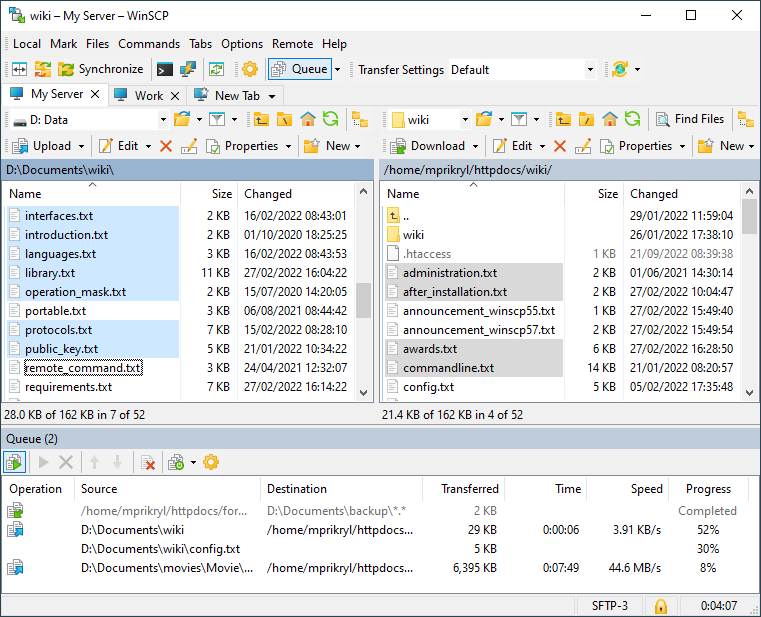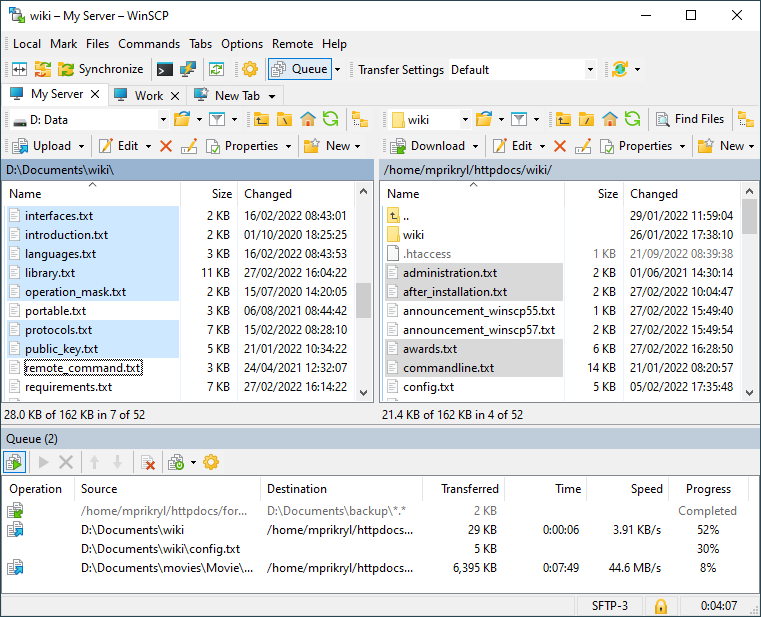5 Open-Source Projects to Transform Your Raspberry Pi into a Local WebDAV Backup Hub
Table of Content
WebDAV extends HTTP to let you work with remote files like they're on your computer. Think of it as a bridge between your devices and remote storage - you can upload, download, edit, and manage files directly through your file explorer.
Popular apps using WebDAV:
- Nextcloud for team storage
- ownCloud for private cloud hosting
- Box for business file sharing
- Seafile for document sync
- Microsoft Office for remote editing
- Adobe Creative Cloud for asset management
WebDAV servers run on most web servers like Apache and Nginx, while WebDAV clients are built into Windows, macOS, and mobile devices. This means you can:
- Access files from any device
- Share and edit documents as a team
- Back up data securely
- Manage website content directly
- Sync files across devices
The best part? It works through standard web ports, so there's no special setup needed. Plus, you control who sees what through regular authentication - perfect for keeping business files secure while still making them easy to access.

FTP vs WebDAV: What's the Real Difference?
Think of FTP as a simple moving truck - it just moves files back and forth. WebDAV is more like having a remote office where you can work on files right where they are.
Here's what sets them apart:
Basic Job:
- FTP: Upload and download files, that's it
- WebDAV: Edit files directly on the server, lock them while you work, rename or move them around
Behind the Scenes:
- FTP needs its own special doorway (ports 20 and 21)
- WebDAV uses the same door as websites (port 80 or 443), making it smoother to use
Security & Safety:
- WebDAV naturally works with web security (like HTTPS)
- FTP needs extra setup to be secure
Daily Use:
- WebDAV feels like using files on your computer - Windows and Mac work with it out of the box
- FTP usually needs separate apps to work
In short, FTP is old school file moving, while WebDAV lets you treat remote files like they're right on your desktop.

WebDAV Raspberry Pi Server, Why and How!
Running your own file server on a Raspberry Pi makes sense for a few simple reasons:
Cost & Power:
- The Pi is cheap to buy
- Uses about as much power as a night light
- No monthly cloud storage fees
Your Data, Your Rules:
- Files stay in your home, not on someone else's servers
- Access your stuff from any device
- Works with Windows, Mac, phones - no extra apps needed
Easy to Start:
- Pi takes minutes to set up
- Can add more features as you need them
- Perfect for home use or small teams
It's like having your own personal Dropbox, but you control everything and only pay once for the Pi. Want to try installing it? I can help with the setup steps.

Setup Raspberry Pi WebDAV Server
To set up a WebDAV server on a Raspberry Pi, install Apache with the mod_dav module on Raspbian or a compatible OS, configure access permissions, and enable HTTPS for secure access. For a simpler deployment, you can use Docker.
A Raspberry Pi WebDAV server offers a private, flexible, and affordable file server solution with diverse use cases for personal and educational needs.
However, there are far more open-source alternatives and guides for that:
1- Arm Webdav
arm-webdav is a free Docker image for creating a lightweight WebDAV server on ARM devices, such as Raspberry Pi. It offers a straightforward setup for hosting and managing files remotely over WebDAV, supporting secure access and file sharing.
This solution is ideal for ARM-based environments needing a simple, efficient WebDAV server.
2- Memory
Memory is an open-source small network storage for secure configuration and password manager. It can be installed and Attached to trusted network with static IP assignment and hostname.
By default, It uses allow from 192.168.1.1/24 rule to only allow trusted subnet traffic access to private data.
Further configuration could allow certain directories access on IoT subnet (VLAN 6 is available).
3- Docker WebDAV image
This is an open-source free tiny image running gliderlabs/docker-alpine Linux and Lighttpd.
you can easily run it using:
docker run --restart=always -d
-p 0.0.0.0:80:80 \
--hostname=webdav \
--name=webdav \
-v /<host_directory_to_share>:/webdav \
jgeusebroek/webdavBy default the WebDAV server is password protected with user webdav and password vadbew which obviously isn't really secure. This can easily be overwritten, by creating a config directory on the host with an htpasswd file and mounting this as a volume on /config.
-v /<host_config_directory>:/config
4- TinyWebDav
TinyWebDav is a lightweight, single-file WebDAV server written in Python, designed for versatility and compatibility across various platforms and devices. The project, consisting of a single 27KB Python file, supports both Python 2 (via webdav.py) and Python 3 (via webdav3.py).
It is built for minimal resource usage and is deployable on multiple systems, including PC, macOS, Linux, iOS (using Pythonista or Editorial on iPads and iPhones), and Raspberry Pi, making it ideal for embedded systems or personal file-sharing needs.
TinyWebDav is a practical solution for users seeking a simple and efficient WebDAV server that requires minimal setup and resources.
Features
- Cross-Platform Compatibility: TinyWebDav runs on desktop operating systems (PC, macOS, Linux) and mobile iOS environments (Pythonista and Editorial on iPad/iPhone).
- Device Flexibility: Also compatible with Raspberry Pi, offering a solution for lightweight or DIY projects.
- WebDAV Client Support: Works seamlessly with various WebDAV clients on PC, macOS, and iOS, allowing remote file access and management.
- Enhanced Windows Explorer Support: With the addition of the
do_PROPPATCHfunction, TinyWebDav now supports Windows Explorer, allowing integration with Windows systems. However, Windows Explorer has a default file size limit of 50MB, which can be adjusted in the registry if needed. - Debug Mode: For troubleshooting, a debug mode (
sys_debug = True) enables logging of WebDAV request and response information. - Bug Fixes and Compatibility Updates: The server has been optimized to address compatibility issues, such as XML namespace handling, making it fully functional with clients like Coda WebDAV.
5- rpi alpine webdav
The rpi-alpine-webdav project provides a lightweight, hassle-free WebDAV server designed specifically for the Raspberry Pi. Built on the arm32v6:alpine Docker image, it is optimized for the ARMv6 architecture, making it ideal for low-resource environments such as Raspberry Pi devices.
Inspired by jgeusebroek/webdav and adapted for the ARM platform, this server offers a straightforward solution for setting up a WebDAV service on embedded devices.
Run the image:
docker run -d
-p 0.0.0.0:80:80
--hostname=web
--name=webdac_container
--mount source=/webdav_data_volume,target=/webav
stephanepiriou/rpi-alpine-webdav- user : webdav
- password : BBD079139851B735F1B4A3198E244D3BD691CFD046D5C77FEA70EDDCAF855356
Use Cases for a Raspberry Pi WebDAV Server
- Personal Cloud Storage: Replace commercial cloud storage services (e.g., Google Drive, Dropbox) with a private, in-home solution for storing and accessing files remotely. With a WebDAV server, you can securely store documents, photos, and backups.
- Collaborative Document Editing: Set up a shared environment where multiple users can access and collaboratively edit documents or project files, making it a low-cost option for small teams or family projects.
- Media Server for Remote Access: Host your media collection (videos, music, photos) on the Raspberry Pi WebDAV server, allowing you to access and stream media files remotely from your own device.
- Backup Solution for Local Devices: Use the WebDAV server to store backups of your local devices (PCs, laptops, mobile devices). Automate daily or weekly backups to keep data securely stored without relying on third-party services.
- Secure Remote Access for IoT Projects: Since the Raspberry Pi is commonly used in IoT applications, a WebDAV server on the Pi can be a secure storage and access point for IoT project data and logs, accessible remotely without complicated setups.
- File Management for Remote Work and Home Offices: A Raspberry Pi WebDAV server can function as a central storage location for remote teams or family members needing access to shared documents, making it a useful and economical alternative to enterprise file-sharing solutions.
- Educational Tool for Learning Server Setup: Setting up a WebDAV server on a Raspberry Pi is an excellent project for learning about servers, networking, and data security, making it a valuable educational experience.
Conclusion
Setting up a WebDAV server on a Raspberry Pi offers a powerful, flexible, and cost-effective way to manage remote file storage, collaboration, and backups right from home.
With the versatility to replace commercial cloud services, enable collaborative editing, and securely host media, a Raspberry Pi WebDAV server gives you full control over your data without monthly fees or reliance on third-party storage providers.
Whether for personal use, small team projects, or IoT setups, the Raspberry Pi’s low power consumption, ease of setup, and compatibility with WebDAV clients on various devices make it an ideal choice.












